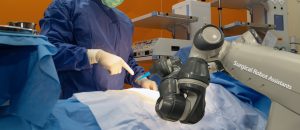 Gallbladder removal surgery, or cholecystectomy is a surgical procedure to remove the gallbladder, a pear-shaped organ that sits below the liver on the upper right side of the abdomen and collects and stores bile made in the liver.
Gallbladder removal surgery, or cholecystectomy is a surgical procedure to remove the gallbladder, a pear-shaped organ that sits below the liver on the upper right side of the abdomen and collects and stores bile made in the liver.
Gallbladder removal surgery is a common surgery that treats many types of gallbladder disease including:
- Gallstones (cholelithiasis)
- Cholecystitis (inflammation)
- Biliary dyskinesia
- Gangrene
- Gallbladder cancer
- Cholangiopathy
- Pancreatitis caused by gallstones
The most common and recognizable symptom of gallbladder disease is biliary colic. It is a pattern of pain in your biliary tract in your upper right abdomen that occurs in episodes, often with nausea. Biliary colic is usually an early sign of biliary disease that is likely to get worse. When your bile flow stalls completely, you’ll feel intense bladder pain that won’t go away until you get medical care. Other signs of possible gallbladder disease include:
- Jaundice
- A swollen abdomen that is tender to the touch
- Large gallbladder polyps discovered on an ultrasound
If you are experiencing any of these signs or symptoms, your healthcare provider will examine you and conduct the necessary tests to diagnose the cause. They will let you know if gallbladder surgery is recommended.
There are three types of gallbladder removal surgery, they include:
- Laparoscopic cholecystectomy
- Robotic cholecystectomy
- Open cholecystectomy
Through the acquisition of the Da Vinci robot surgical platform, Jamaica Hospital Medical Center can now perform minimally invasive robotic surgical procedures.
There are many potential advantages of robotic-assisted surgery over other types of surgery, including:
- Robot-assisted surgery provides the surgeon with 3D images inside the abdomen and pelvis that create a clearer picture to reference as they operate.
- Under the surgeon’s direction, the robot can move more freely and with more versatility than a human hand
- You’ll have a few tiny scars.
- You’re more likely to experience less pain and less bleeding after surgery compared to open surgery.
- A shorter hospital stay.
For more information about robotic surgery at Jamaica Hospital Medical Center or to learn more about other surgical options, please call (718) 206-7001 to make an appointment.
All content of this newsletter is intended for general information purposes only and is not intended or implied to be a substitute for professional medical advice, diagnosis or treatment. Please consult a medical professional before adopting any of the suggestions on this page. You must never disregard professional medical advice or delay seeking medical treatment based upon any content of this newsletter. PROMPTLY CONSULT YOUR PHYSICIAN OR CALL 911 IF YOU BELIEVE YOU HAVE A MEDICAL EMERGENCY.
